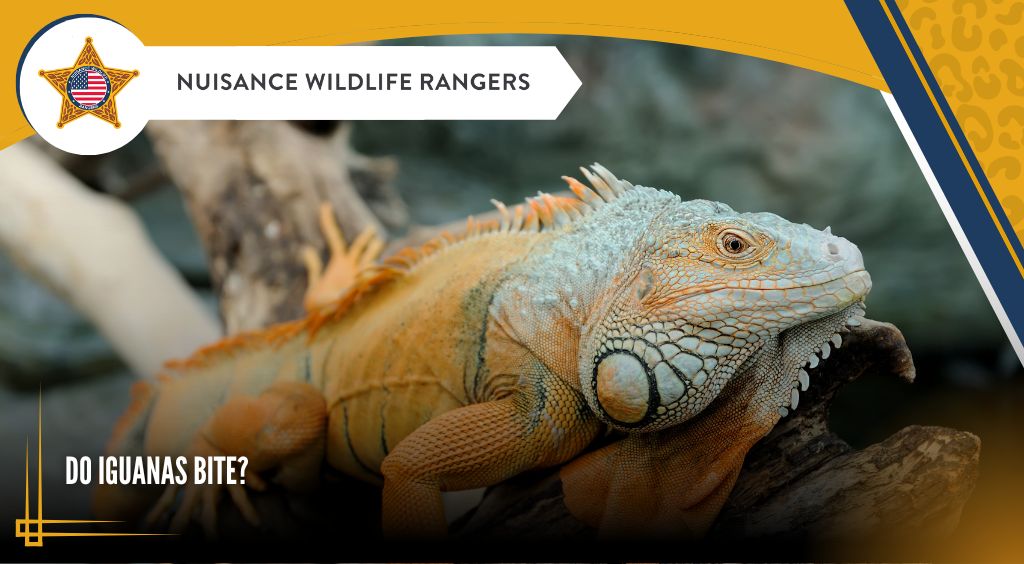 Iguanas are considered an invasive species in the United States. However, they are common in both South Florida and Hawaii because they were introduced in these states for exotic pet trading in the early 1960s. Green iguanas are native to South America, Mexico, and some of the Caribbean islands.
Iguanas are considered an invasive species in the United States. However, they are common in both South Florida and Hawaii because they were introduced in these states for exotic pet trading in the early 1960s. Green iguanas are native to South America, Mexico, and some of the Caribbean islands.
While iguanas are not considered an aggressive species, they might bite if they feel threatened. You should never approach an iguana or attempt to move one on your own.
Iguana bites can be dangerous to humans because they can break the skin, introducing bacteria to your system that might lead to infection. Additionally, they are known to carry salmonella bacteria, which could cause you to become incredibly sick.
Thankfully, professional wildlife control companies like Nuisance Wildlife Rangers can help you remove iguanas from your property for good. Instead of attempting to solve the problem on your own, give us a call.
In this article, you will learn:
- Whether iguanas are dangerous
- How to tell if an iguana is ready to bite you
- How to remove iguanas from your property
- Why you should contact a professional iguana removal service
Are Iguanas Dangerous?
Iguanas are a part of the reptile species. They have scales, long tails, and piercing eyes. While they might be cool to look at from a distance, you should avoid getting too close to them.
Even though iguanas are not natural predators, they might attack you if you feel threatened. If you are bitten by an iguana, you are at risk of developing bacterial infections, experiencing damage from the bite, and more. They are also known for tail whipping, which can cause significant bodily harm.
Male iguanas are considered to be more aggressive than females. While they both have sharp teeth, the males are larger, which makes a bite more serious. If you come across iguanas on your property, it is best to leave them alone and call a professional to come and remove them.
How to Tell if an Iguana is About to Bite
Iguana teeth are serrated, which means they can cause deep flesh wounds. Usually, they only bite if they are provoked. This means if you attempt to catch an iguana, you are likely to be bitten.
It is helpful to be aware of the signs that an iguana is about to strike. If you notice these behavioral signs, you should slowly back away from the iguana:
- Standing on all four legs
- Drawing in a deep breath
- Making its body appear larger
- Lowering of the iguana’s dewlap (the skin flap beneath the chin)
- Hissing or flipping their tail
- Rapid head bobbing
It is most common for male iguanas to become aggressive during the mating season. Because they are on the hunt for a mate, they do not want to be bothered by other creatures. Female iguanas could become defensive if you are near their nest of eggs or babies.
How to Get Iguanas Off of Your Property
Iguanas can leave droppings all over your pool deck, ruin your garden, dig burrows in the ground, spread disease, and potentially bite you or your kids. For these reasons, it is understandable to want them off of your property. There are a few ways to ensure that iguanas do not return to your yard.
Block Their Entrances
While iguanas can climb fences, you can make it less likely for them to enter your yard by blocking their entrances. Iguanas dig burrows, so you should install a fence that has metal plates in the ground underneath the fencing. This will make their burrowing unsuccessful, preventing them from entering your yard.
Keep Your Property Clean
Iguanas like to come onto properties that have vegetation or greenery that they can snack on. By maintaining your yard and protecting gardens with a greenhouse or something similar, you can prevent iguanas from being attracted to your property.
Use Plants that Deter Iguanas
Certain plants deter iguanas because they do not like the smell or taste. Some of these plants include crotons, ixora, oleander, milkweed, and citrus. By planting these types of vegetation, you might make iguanas less likely to enter your property.
Contact a Professional
While the Florida Fish and Wildlife Conservation Commission allows homeowners to kill iguanas on private property, you should leave iguana control to the professionals.[1]
Professional wildlife removal companies like Nuisance Wildlife Rangers will trap and remove iguanas from your property. Because of our years of experience in wildlife control, we will do so in a manner that prevents everyone from being harmed. Additionally, we will help you create an environment that iguanas are less likely to return to.
Finding a Professional Iguana Removal Service
If you or a loved one are suffering from an iguana infestation, you’ve come to the right place. At Nuisance Wildlife Rangers, we can remove all of the iguanas from your property, help you repair any damage, and give you advice on deterring iguanas in the future.
Contact us today for more information on how our iguana removal service works.
References:
- The Florida Fish and Wildlife Conservation Commission (FWC): Green Iguana
